Unit 11 Could you please tell me where the restrooms are? 全单元课件
文档属性
| 名称 | Unit 11 Could you please tell me where the restrooms are? 全单元课件 | 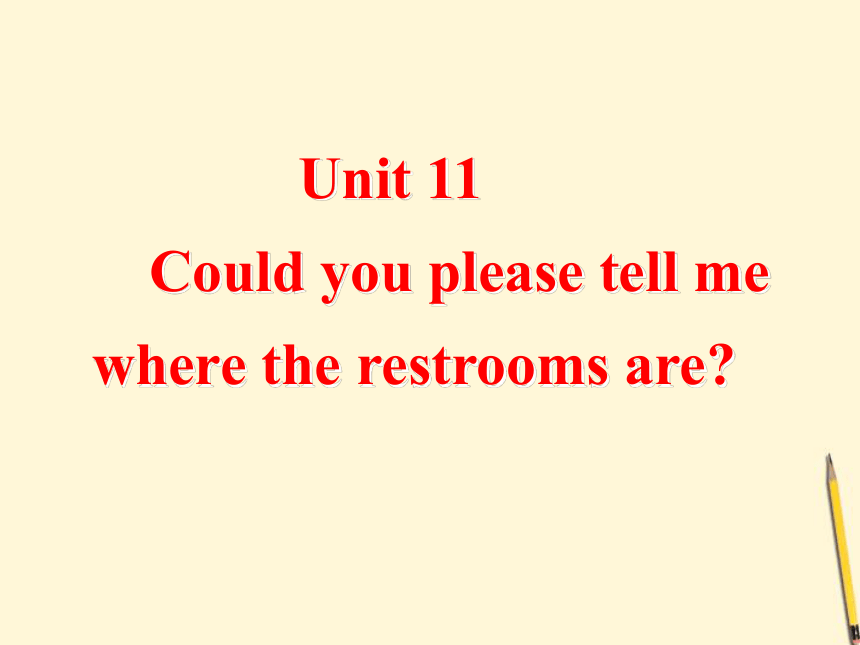 | |
| 格式 | zip | ||
| 文件大小 | 7.3MB | ||
| 资源类型 | 教案 | ||
| 版本资源 | 人教新目标(Go for it)版 | ||
| 科目 | 英语 | ||
| 更新时间 | 2013-09-09 23:11:32 | ||
图片预览

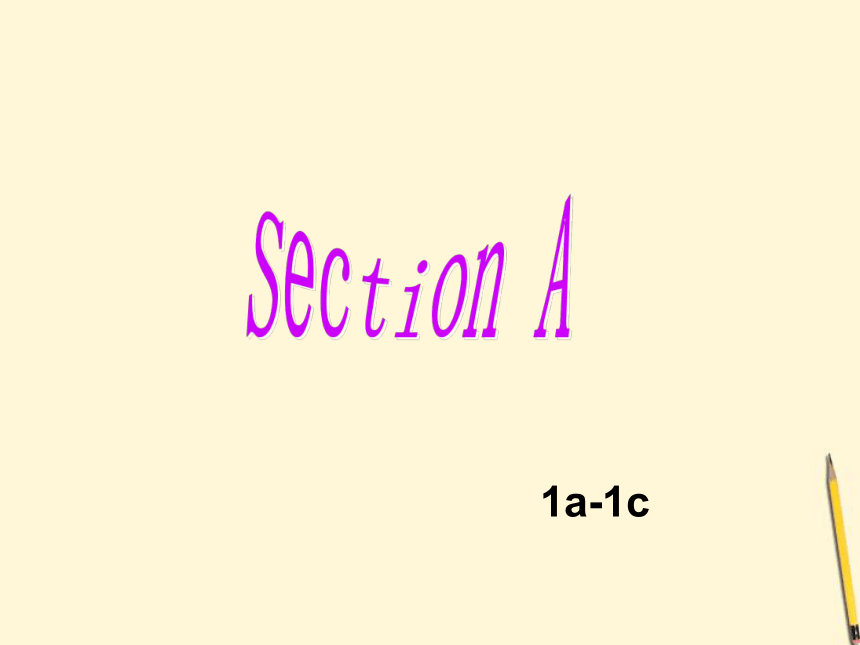
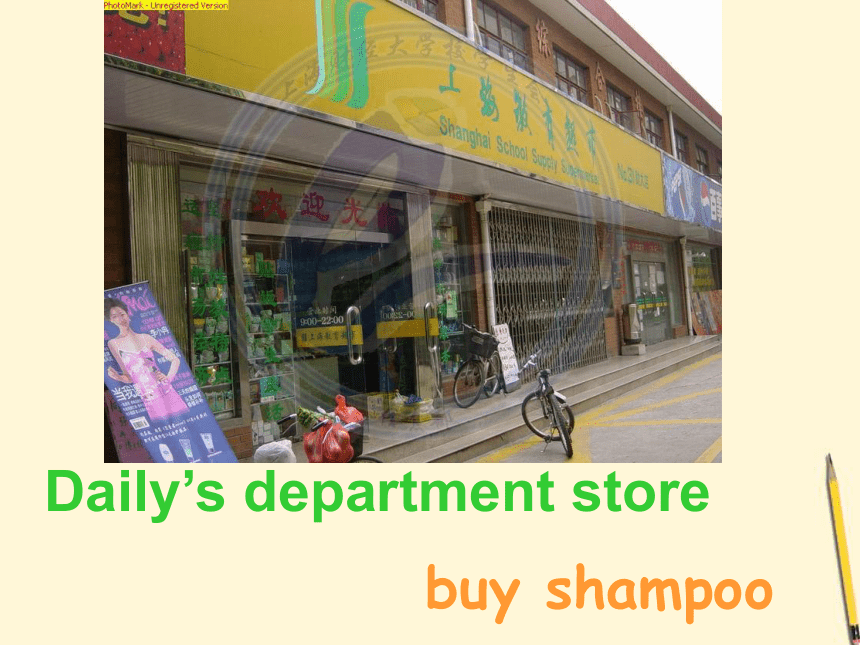
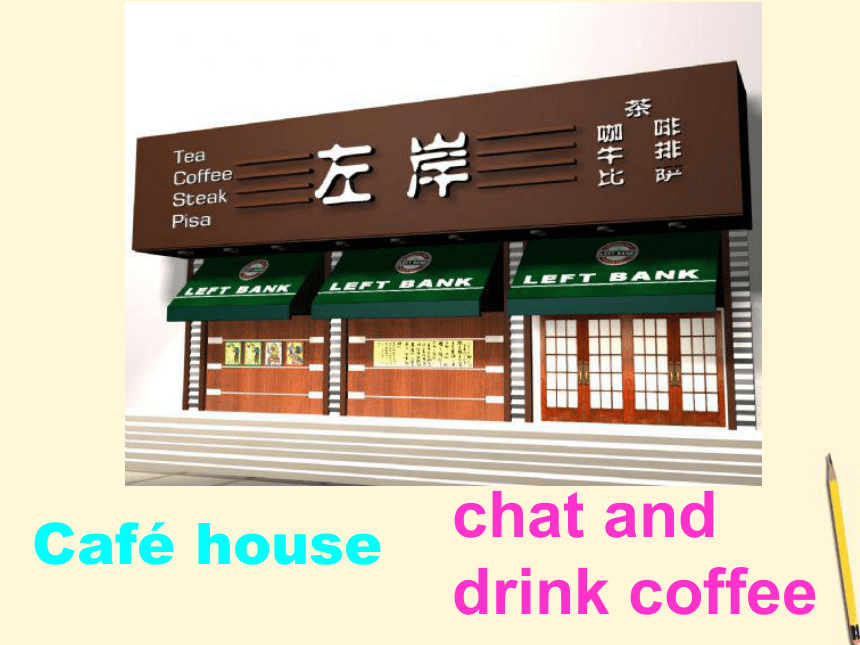


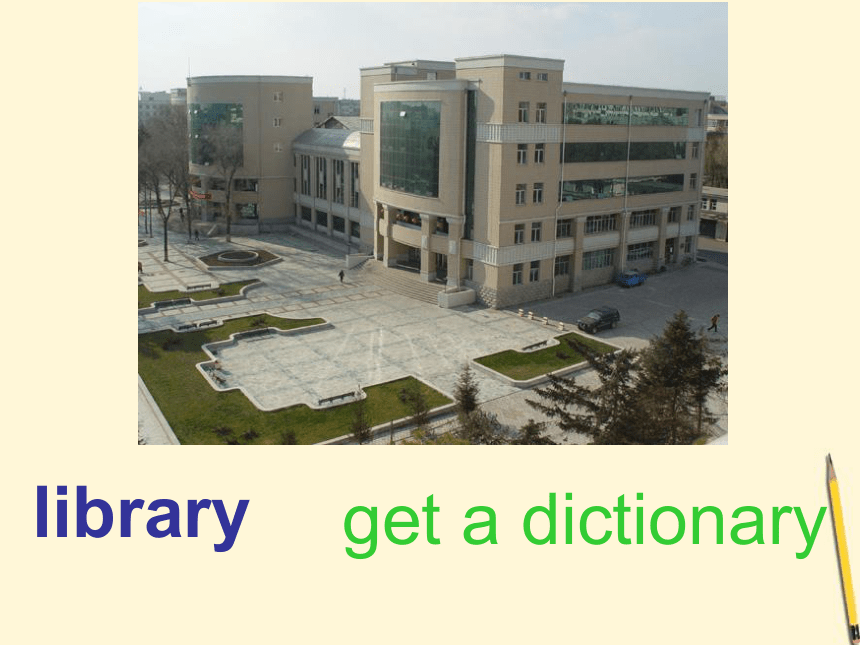

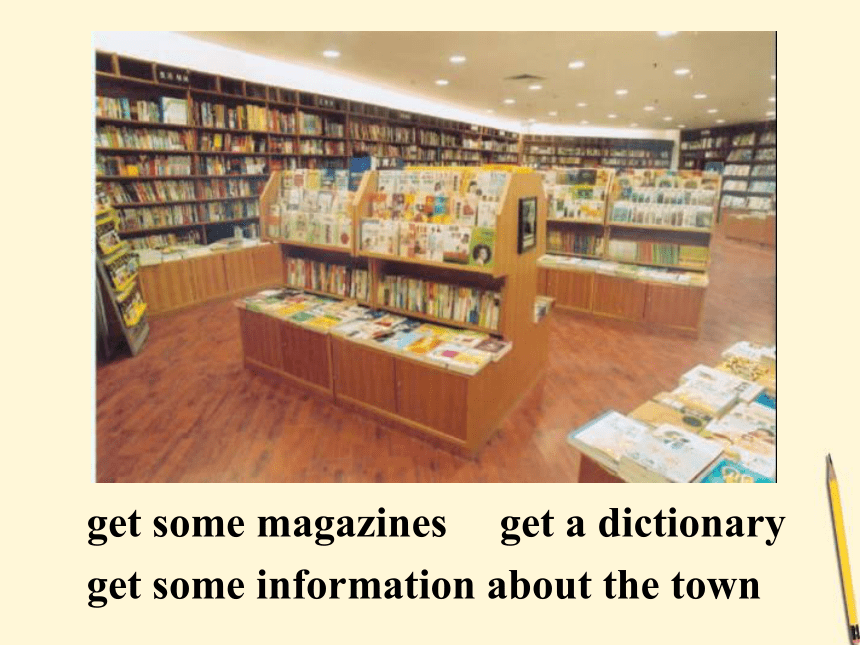
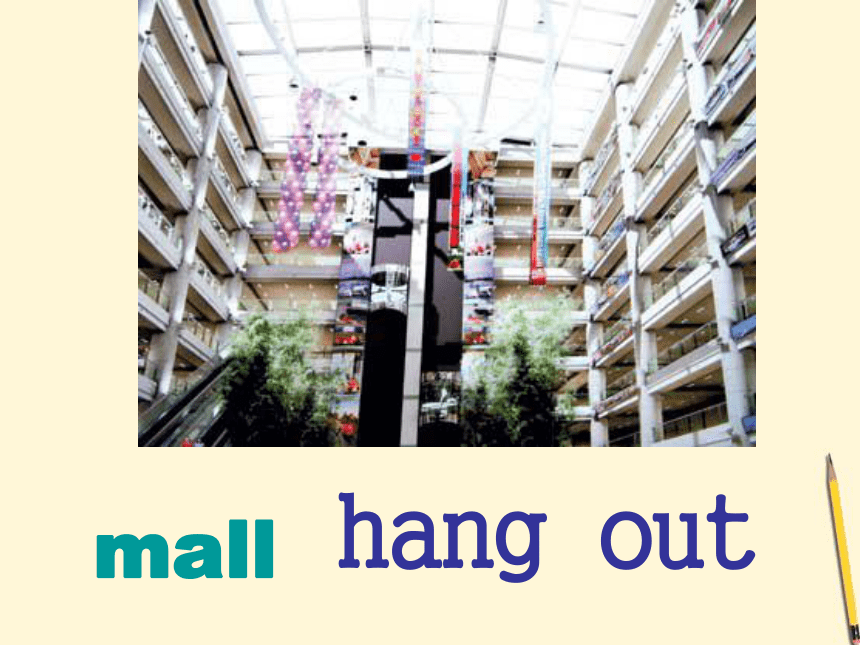
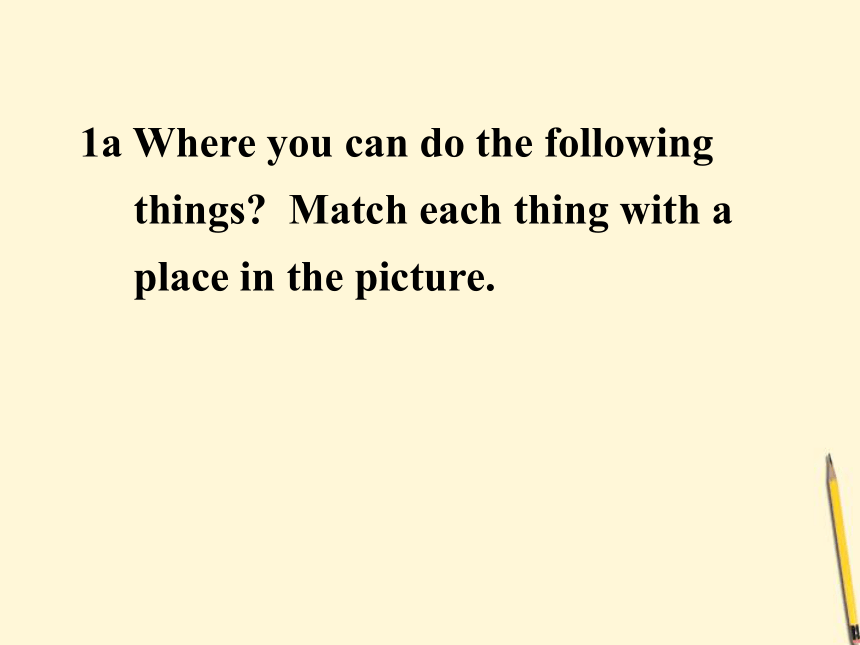
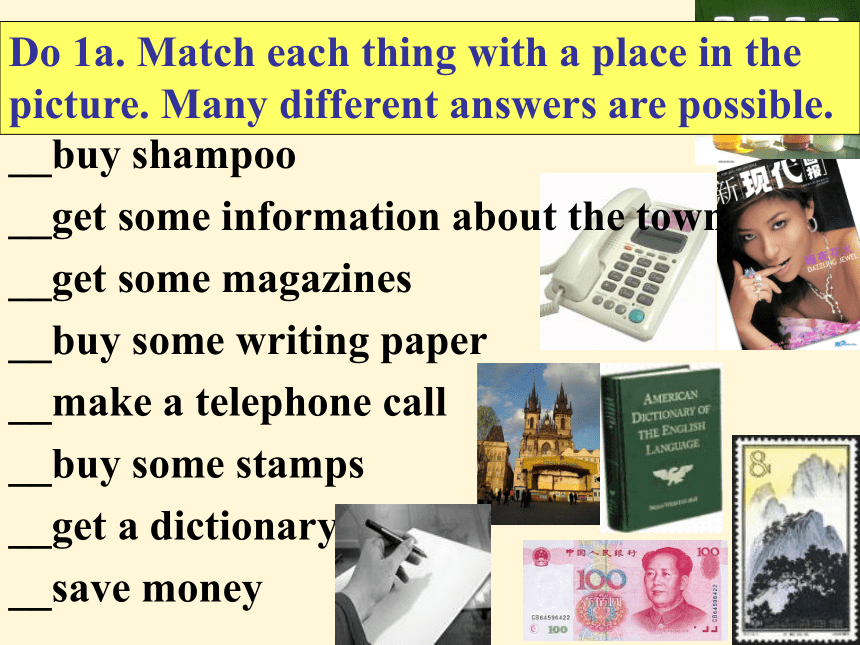
文档简介
课件190张PPT。 Unit 11
Could you please tell me where the restrooms are?
Section A1a-1cDaily’s department storebuy shampooCafé housechat and
drink coffeebanksave moneydrugstorebuy some writing paperlibraryget a dictionarypost officebuy some stampsget some magazines
get some information about the town
get a dictionarymallhang out1a Where you can do the following
things? Match each thing with a
place in the picture. __buy shampoo
__get some information about the town
__get some magazines
__buy some writing paper
__make a telephone call
__buy some stamps
__get a dictionary
__save moneyDo 1a. Match each thing with a place in the picture. Many different answers are possible._____buy shampoo
_____get some magazines
_____make a telephone call
_____get a dictionary
_____get some information
about the town
_____buy some writing paper
_____buy some stamps
_____save moneyc/aa/da/edd/ea/cebturn leftturn rightgo acrossgo pastCould you please tell me where _________ is?
How can I get there?turn leftturn rightgo straightbetween the bank and the post officego past the post officego across the roadthe hotelthe public phonedrugstorebankCafé houselibrarypost officeDaily’s department
storeMain center1b Listen and complete the conversation.Excuse me. Do you
know where I can save
money?Yes. There’s a post
office on Center
Street
Sure. There’s a
bank on Main
Street.Conversation 1
Girl1: Excuse me. Could you tell me where I can buy some stamps?
Boy1: Yes. There’s a post office on Center Street.
Girl1: Oh. Can you tell me where Center Street is?
Boy1: Sure. Go past the bank. Center Street is on your right.
Girl1: Thanks a lot.
Boy1: No problem. Conversation 2
Girl2: Excuse me. Do you know where I can save money?
Boy2: Sure. There’s a bank on Main Street.
Girl2: Oh. Could you please tell me how to get there?
Boy2: Yes... Go straight ahead. The bank is on your left.
Girl2: Thank you.
Boy2: You’re welcome. 1. Could you please tell me where the restrooms are?
请你告诉我厕所在哪儿好吗?
Could you…?是个句型,could在此不是过去形式,它此时表示语气婉转、有礼貌。Explanation 在希望得到肯定答复的疑问句中,以及在含有表示建议、请求和征求意见语气的疑问句中, 常用some和something,而不用any和anything。
【例】
(1)Could you lend me your motorbike, please?
请把你的摩托车借给我好吗? (2)Could you tell me something about yourself.
请谈谈你自己好吗?
(3)Would you like to have some apples?
你们要吃苹果吗?(4)What about saying something about your school?
说说你学校的情况好吗?
(5)Will you please give the poor boy something to eat?
请给那可怜的孩子一点吃的东西
好吗?2. Can you please tell me where I can get
a dictionary?
请你告诉我在哪儿能买到字典好吗?
Can you please tell…,是个句型,它
后面可跟宾语从句,也可跟不定式结构。
can可换成could, would, will。【例】
(1)Could you please tell me where we show our tickets?
请告诉我在哪儿验票好吗?
(2)Would you tell me how much it costs to fly to Canada?
你能告诉我乘飞机去加拿大要多少钱吗? (3)Will you tell me when we will have a meeting?
请告诉我我们什么时候开会好吗?
(4)Can you tell me who the old man is?
你能告诉我那位老人是谁吗?(5)Could you tell me how to get to the post office?
你能告诉我到邮局怎么走吗?
(6)Can you tell me what to do next?
你能告诉我下一步怎么做吗?
Section A2a-2csupermarket supermarketCould you tell me where the supermarket is ?on Bridge StreetBank beside the bank
next to the bankBridge StreetsupermarketwasBankHotelbetween the hotel and the bankLibraryin front of the libraryPark across from the parksupermarketsupermarket径直走
在银行旁边
在交通灯处
向右转
向左转
在…和…之间
在你的左边
在你的右边
在…的对面Translate the following phrasesgo straight aheadnext to the bank at the traffic lightsturn right turn leftbetween ..and…on your left on your right across from2a Number the directions in the order that you hear.Take the elevator to the second floor.
Turn left.
Take the escalator to the second floor.
Turn right.
The drugstore is between the furniture
store and the bookstore.
Go past the bank.2431Boy1: Excuse me. Can you tell me where I can buy some shampoo?
Boy2: Yes. There’s a drug store on the second floor. Um. Let me think... Take the escalator to the second floor and then... then you turn left. Let’s see... Then go past the bank. And um... The drug store is between the furniture store and the bookstore. You should be able to get shampoo there.
Boy1: OK, great. Thanks a lot.
Boy2: You’re welcome. Tapesripts2c PAIRWORKExcuse me. Do you know where
I can exchange money?Sure. There’s a bank on the
second floor. Take the escalator
to the second floor and turn right.
The bank is next to the bookstore.1. Take the elevator to the second floor.
乘电梯上二楼。
take在此表示“搭、乘”的意思。
【例】
(1)He told me to take an express.
他叫我搭乘特别快车。Explanation (2)She takes a bus to work every day.
她每天乘公共汽车上班。 在美国和英国,对楼层的说法是不一样的, 请对比:4. The drugstore is between the furniture store and the bookstore.
(1)between prep.“在……两者之间”,常与and连用。例如:
Do you know the difference between the two verbs“bring”and“take”?
你知道bring和take这两个动词的区别吗? (2)among prep.“在……当中”,指三者或三者以上之间。例如:
They saw a village among the hills.
他们看到群山中有个村庄。5. Do you know where I can exchange
money?
你知道我在哪可以换钱吗?
exchange money指的是两种不同的币
种间的交换。
如:exchange Pounds for Dollars
用英磅换美元
exchange作为n.是外币兑换本金之意。 5.The bank is next to the bookstore.
银行在书店的隔壁。
next to是“贴近,隔壁”的意思。
【例】
(1)The house standing next to ours is a cinema.
我们隔壁的那幢房子是一家电影院。(2)Who is crying in the room next to mine?
谁在我隔壁房间里哭?语法重点:宾语从句一、概念
由一个句子充当宾语,我们称之为宾语
从句。
e.g. I know the answer.(名词做宾语)
I know that Tom gets the answer.
(句子做宾语, 叫做宾语从句)二、宾语从句的连接词
由陈述句变化而来用that引导, that
可省略;
由一般疑问句变化而来, 用if或whether
引导;
由特殊疑问句变化而来, 用该特殊疑问词
引导。He said, “I like playing basketball.”
He said that he liked playing basketball.
He asked me, “Do you like playing basketball?”
He asked me if I liked playing basketball.
He asked me, “Where do you play basketball?”
He asked me where I played basketball.三、宾语从句的语序
永远都是陈述句语序
e.g. He asked me who was the boy. ( )
He asked me who the boy was.( )四、宾语从句的时态变化
主句是一般现在时,从句可以用任何时态.
主句是一般过去时,从句必须是过去时态的一种:
一般现在时 一般过去时
一般过去时 过去完成时
现在进行时 过去进行时
一般将来时 过去将来时
现在完成时 过去完成时五、宾语从句的人称变化
人称代词要随合理的逻辑而自然变化.
六、由who, what, how, which, whose, where, when,
why等引导的宾语从句,特殊疑问词作为引导词,
没有疑问的作用,但本身的意思不变。要注意
时态的一致和陈述语序。
e.g. The reporter will tell us what he saw and heard
in Japan.
Do you know where the Great Pyramid is?在这一单元中,我们重点练习where引导的宾语
从句。Where后面的从句一定要用陈述语序。
e. g. Do you know where I can get a dictionary?
Can you please tell me where I can get
some magazines?
Could you tell me where I can buy shampoo? I asked if there were any good restaurants
in zhongshan? She said that parks should be beautiful
Object Clause 宾语从句 Did you sleep well last night?
David asked.? David asked if you slept well last night. Is he doing his homework? Jim askedJim asked if he was doing his homework. Has he finished his work ?
I want to know I want to know if he has finished
his work. Where does he live? I don't knowI don't know where he lives. How can I get to the station?
Could you tell me?Could you tell me how I can get to the station? Where is Tom? They asked. They asked where Tom was. 典型例题解析 1.Could you tell me _________??
A. when will Tom come back?
B. when does Tom come back?
C. when Tom will come back?
D. when Tom comes back? C 2. Do you know _________ during the coming summer holiday??
A. what will Tom do? B. what did Tom do
C. what Tom will do D. what Tom did? C 4.Mr King didn't know _________
yesterday evening.?
A. when does his son come home?
B. when his son comes home?
C. when did his son come home?
D. when his son came home? 3.—Do you know _________??
—Next year.?
A.when he come ? B.when did he come ?
C.when he will come D.when will he come 典型例题解析C D3a Read the article. Then list the advantages and disadvantages of going to the mall.GroupworkWhere do you usually hang out with friends?What are the advantages and disadvantages of each place?A: Where do you usually hang out with your friends? B: We usually go to my friend, Qiu’s place? A: Is that a good place to hang out? B: Well, it has advantages and disadvantages. It’s kind of small. But Qiu’s mom is a wonderful cook, so we always have great snack.Report: In our group, XX usually hangs out … He/She thinks…Explanation1. We decided to talk to some students about why they go there.
我们决定和一些同学谈论一下他们为何去那。
decide to do sth. 意为决定做某事。
I have decided to sell my house.
我已决定卖掉房子。此外有此意义的词组还有:
(1)make one’s decision to do sth.
decision n.决定
(2)make up one’s mind to do sth.
(3)set one’s mind to do sth.
如:
He made his decision to go to the USA.
他决定去美国了。
He needs someone to make up his
mind for him.
他需要别人替他做决定。2. I go to the mall because my friend
hang out there.
我去的原因是我的朋友经常在那闲逛。
hang out意为闲逛,此外hang about /
around亦有此意。如:
Men hanging about at street corner, waiting for the pubs to open.
闲逛在街道拐角上等着酒店开门的人们。 hang / h /
悬挂 pt. pp hung
绞死 pt. pp hanged
同学们应该注意此词在不同意思时,过去式与过去分词的不同形式。例:
(1)She hung the washing in the garden.
她把洗好的衣服晾在花园里。
(2)He was hanged for murder.
他因杀人而被绞死。 3. I prefer being outside.
prefer vt.“较喜欢、宁愿”,其后可
接名词、-ing形式及动词不定式,还用
在“prefer…to…”结构中,表示“喜
欢……而不喜欢……”。例如:
Do you prefer coffee or tea?
你喜欢咖啡还是茶?
He prefers to wait until evening.
他宁愿等到天黑。
I prefer doing to talking.
我喜欢做不喜欢说。 4. There’s always something happening.
总会有事发生。
happening是现在分词作定语, 当然过
去分词也可作定语。
【例】(1)We can see the rising sun.
我们可以看到东升的旭日。
(2)He is a retired worker.
他是位退休工人。 (3)There was a girl sitting there.
有个女孩坐在那里。
(4)This is the question given.
这是所给的问题。
(5)There is nothing interesting.
没有有趣的东西。5. It’s also just fun to watch people.
(1)fun娱乐、快乐 为不可数名词, 上句意为观看人就是很有趣的。
(2)for / in fun 意为开玩笑地、非认真地。
He said it only for fun.
他只是说着玩的。
(3)make fun of 取笑“It’s+名词/形容词+to do sth.”结构,
其中“作形式主语,动词不定式作真正的
主语。例如:
It is a great pleasure to talk with him。
和他谈话是一件非常愉快的事。
It is necessary for us to have some
exercise every day.
我们每天需要一些运动。6. When I go into stores I always spend
too much money.
当我走进商店,我总会花掉很多的钱。
(1)spend意为花钱,用钱
spend money on sth. 例:
She spends too much money on clothes.
她花在服装上的钱太多。(2)spend意为“用尽,耗尽”
spend sth. on sth. / in doing sth.
例:
They always spend a lot of time(in)
explaining a plan / on a projector.
他们总会花费很多的时间来说明一
项计划。7. It’s kind of small.
它有点小。
kind of 有点,相当。
例:
I’m feeling kind of tired.
我感到有点累。 8. Go past the park.
走过公园。
(1)past此处为介词,意为“越过”。例:
The boys rushed past us.
男孩们从我们身旁越过。(2)past还可以作为副词用,意为“经过”。例:
Days went past without any news.
日子过去了,一点消息也没有。 (3)past还可以作为名词来用,the past以前, 过去的事, 往事
In the past he has been a milkman and now he’s a farmer.
从前他曾经是送牛奶工人, 现在他是个农场主。【例1】 When I went to have the beer, I realized I had my wallet at home. ?
A. forgotten B. left? C. had D. taken? 典型例题解析【例3】 —Do you know _________ I could pass the exam??
—Sorry, I've no idea.?
A. that B. whether C. what D. which? ? B【例2】 Could you tell me _________? ?
A. when will Tom come back?
B. when does Tom come back?
C. when Tom will come back?
D. when Tom comes back? CB 【例4】 Do you know _________ during the coming summer holiday? ?
A. what will Tom do? B. what did Tom do
C. what Tom will do ?D. what Tom did? C 【例7】 Mr King didn't know _________ yesterday
evening. ?
A. when does his son come home?
B. when his son comes home?
C. when did his son come home?
D. when his son came home? 【例5】 —Do you know _________? ?
—Next year.?
A. when he come ? B. when did he come ?
C. when he will come ?D. when will he come 典型例题解析C 【例6】 Could you tell us _________? ?
A. when you will send the fridge to our house?
B. when will you send the fridge to our house?
C. when you would send the fridge to our house?
D. when would you send the fridge to our house? DACould you please tell me where the restrooms are ?Unit 11Section B1a. Look at the places in your book!
Write the most important words first!interesting 有趣的
inexpensive 不贵的
uncrowded 不太拥挤的
beautiful 漂亮的
safe 安全的
fascinating 精彩的
delicious 美味的,可口的
big 大的
convenient 方便的
clean 干净的restroom: clean, uncrowded, inexpensivemusem: interesting, fascinating, inexpensive restaurant: delicious, clean, inexpensivepark: beautiful, big, interesting, clean, inexpensive subway: convenient, safe, uncrowded, inexpensivemall: inexpensive, clean, safe, convenient,
beautiful1b. Pairwork Talk about places in our city using
the words below!
interesting inexpensive uncrowded
beautiful convenient fascinating
delicious big clean safe A sample dialogue A: The Arts Museum is really interesting.
B: Yes, and it’s fascinating, too.2c. PairworkA: Can you tell me where there’s a good
place to eat?
B: Of course. What kind of food do you like?2a Listeningrestroomsmuseums2b
Green LandThe corner of market and Middle StreetsThe computer museum3a Reading 3a.Read the article and fill in the chart!watertownclownsdress updress up as clownsslide
water slide
clown
staff
organized
dress up
marketNew words滑道
水滑道
小丑
工作人员;全体职员
有组织的;安排有序的
穿上盛装;装扮
市场;集市广场Uncle Bob’sFarm’s marketClown City CafeOrganized games clownsDance lessonsScience museumSports museumHistory MuseumEat, have fun and learn in Watertown! Watertown is a place for the family to _______________(度假). Teenagers will want to visit the world’s largest _____________(水滑道) and eat at Uncle Bob’s. A different rock band plays at Uncle Bob’s every night. Kids will enjoy the Clown City Cafe. They have _____________(organize) games and the staff _____________(盛装打扮) as clowns.
There’s also a lot for parents in Watertown. If they love good food, they can find it at the Farmer’s Market where the food is _______delicious _________(既……又……)cheap. While the children have fun, parents can __________________(上舞蹈课) on the beach. And everyone can learn something in Watertown. There are three museums! Teenagers love the Sports Museum and kids enjoy the Science Museum. Parents will spend many happy hours _____________(walk)through the History Museum.take a vacationwater slidesorganizeddress upboth andtake dance lessonswalkingWatertown is a great place for the family to take a vacation.
对一个家庭来说,水乡(城)是一个度假的好地方。
(1)someplace + is +…for sb. to do sth.是大家常用的一个固定句型。Explanation 例:
Library is a quiet place for students to read books.
(2)vacation是假期,休假之意, 有短语
on vacation。
例:
They are in Florida on vacation.
他们正在佛罗里达度假。2. A different rock band plays at Uncle
Bob’s every night.
每天晚上在鲍勃叔叔的餐馆里总有一
支不同的摇滚乐队演奏。
Uncle Bob’s中’s属格后的名词省略掉
了。因为’s属格后的名词如指商店、
家宅等地点时,该名词常省略。 如:
at the doctor’s 在诊所
to my uncle’s 到我叔叔家
Johnson’s = Johnson’s Shop
约翰逊商店3. They have organized games and the
staff dress up as clowns.
他们组织了游戏,并且员工化装为小
丑。
(1)staff为一个机构的全体工作人
员。例:
The school’s staff is / are excellent.
这个学校的教职员是很优秀的。 (2)dress up
通常指小孩穿别人衣服闹着玩,装扮
to dress up as an astronaut
装扮成宇航员
另外,还有穿上礼服,穿上盛装之意。例:
Don’t bother to dress up for the party.
不必为这次聚会穿礼服。(3)dress in和be dressed in用来形容某人的外表。
She always dresses in black.
她总是穿黑衣服。
I’ll be dressed in a red coat.
我将会穿件红色的大衣。 wear“穿着(衣服)”亦表示一种状态。
She always wears black.
put on则指穿衣这个动作。
例:
She put on a woolly scarf before she
went out.
她出门前带上了毛围巾。4.…where the food is both delicious and cheap.
食品既好吃又便宜。
both…and…是并列连词,当它连接两个主语时,谓语要用复数。
例:
(1)Both my father and mother like singing.
我父母都喜欢唱歌。(2)A man should have both courage and perseverance.
一个人既应有勇气也要有毅力。
(3)We must pay attention both to English and to other subjects.
5. Is that a good place to hang out?
那是一个闲逛的好地方吗?
to hang out是不定式作后置定语修饰a good place这个名词短语。
如:
(1)She has nothing to say.
她无话可说。
to say是不定式作后置定语修饰nothing.
(2)They have little food to eat.
to eat是不定式作后置定语修饰little food.6. While the children have fun, parents can take dance lessons on the beach.
当孩子们嬉闹的时候,父母可以在海滩上进行舞蹈课。
(1)while连词,当……的时候,和……同时。如:
They arrived while we were having dinner.
他们来的时候我们正在吃晚饭。(2)while后面所引导的动词,往往
是可持续的。
when当……时,持续或非持续性
动词都可跟在when后面。
I jumped up when she called.
她打电话来时,我吓了一跳。
as正当……的时候,随着,强调同
时发生。 He saw her as he was getting off the bus.
正当他下公共汽车时,他看见了她。
(3)take从事,进行。如:
I’m going to take a walk / a bath / a break.
我要去散散步/洗个澡/歇一会儿。3b. Complete this guide to Sunville. Sunville has something for everyone. If you are
looking for museums, there is a computer museum
in Sunville. There are lots of restaurants in
Sunville. Green land has delicious salads. There
are very clean Public restrooms at the corner
of Market and Main Street. 4. Groupwork One student is an information booth worker, and the other students are tourists. The tourists ask questions about your city.A sample dialogueA: Could you please tell me if there are
any good museums in Newtown?
B: Yes. There’s a fascinating science one.
There’s also a very interesting art
museum next street.Self CheckFill in the blank with the correct
word given. beautiful
What a beautiful day! safe
n. 保险箱, 饭橱,
菜橱, 冷藏室
adj.免受攻击的,
安全的, 可靠的,
有把握的delicious
variety of sweet
eating apples convenientfascinating
a fascinating shop
window display
1. I live right next to a supermarket. It’s
very___________.
2. I find stamps__________. I’ve been
collecting them for many years.
3. Mr. Tan makes the best noodles in town.
They’re __________!
4. The Fine Arts Museum is both __________
and interesting.
5. Put your wallet in a ______ place.convenientbeautifulfascinatingsafedelicious1.I live right next to a supermarket.
我就住在超市的隔壁。
right在此起到强调的作用,它是副词,含义很多,如:“对,顺利,直接地,正好,完全,非常”等。
【例】
(1)You have guessed right.
你猜对了。(2)Everything will go right with you if you follow the doctor's advice.
如果你照医生的建议去做,一切都会好的。
(3)The wind was right in the face.
风迎面吹来。(4)They placed the table right in the
middle of the room.
他们把桌子放在房间正中。
(5)He has read right through the book.
他把这本书全部读完了。
(6)I am right glad to hear the news.
听到这个消息我非常高兴。 2.I’ve been collecting them for many years.
多年来我一直在收集他们(邮票)。
本句是个现在完成进行时的句子,表示现在以前这一段时间里一直在进行的动作,这动作可能仍然在进行,也可能停止了一会儿。【例】
(1)How long has it been raining?
雨下多久了?
(2)We’ve just been talking about you.
我们正谈着你呢。(3)What book have you been reading these days?
这几天你在看什么书?
(4)I’ve been hoping I’d have chance to see the film.
我一直盼望有机会看这部电影。3. What kind of food are you looking for?
你在找哪种食品?
look for是个短语,强调“寻找”这一动作,而find则强调找的结果,表示“找到”;类似的词语还有hear和listen to。
【例】(1)The young lady is looking for her pet dog.
那位年轻的女士在找她的宠物狗。(2)He has found his lost bike.
他已找到丢失的自行车了。
(3)They are listening to a piece of beautiful music.
他们正听一曲优美的曲子。
(4)He heard their whisper.
他听见他们在低声说话。schooltheatremuseumparktoilettrain stationbookshoprestaurantWhere’s the theatre?Walk along this road, and take the first turning on the right. a hundred metresIt’s about a hundred metres along the on the left.Practise schooltheatremuseumparktoilettrain stationbookshoprestaurant two hundred metresWhere’s the museum?Just for fun!Martian n. (假想的)火星人
adj.〈天〉火星的 假如你是Han Meimei。你和几个朋友约定星期天去人民公园游玩。你去Rose住处邀请她参加。不巧她不在。请你根据下面的示意图,用英语给她留个便条告诉她人民公园的游览路线图,以及进公园后如何找到你们。HomeworkThank you for listening! ReadingUnit 11
Could you please tell me where the restrooms are?New Wordslend
park
alright
wonder
trouble
offend
structure
hand in借给;借出
停车
好吧(=all right)
觉得奇怪,想知道
(使)烦恼;麻烦;打扰
冒犯;得罪;使生气
结构,构造
交上,呈送schooltheatremuseumparktoilettrain stationbookshoprestaurantWhere’s the theatre?Walk along this road, and take the first turning on the right. a hundred metresIt’s about a hundred metres along the road. It’s next to the bank.Practice Make a conversation with your partner.schooltheatremuseumparktoilettrain stationbookshoprestaurant two hundred metresWhere’s the museum?Where is the People’s Park?
_______ (ask) for information
or help is a very common
and necessary activity when we are in trouble.Asking主语_________________________
_____Hey! Where is the People’s Park?strangerIs he glad to help me?Why not?rudeI don’t know. rude = impoliteMy request sounds ______________.Excuse me. Could you please tell me where the People’s Park is?Sure. Take No. 23 Bus and you will get there.Polite__________( know) how _______(ask) for information __________( polite) is very important.Knowing to ask politelyUsing suitable language!The culture of a nation is in its language. It is not enough to only know correct grammar. It is also very important to know how to choose suitable language for every situation.运用合适的语言文化国家情况Could you please lend me your pen ?Before You ReadIf you need help with your homework, how would you ask : 1. your mother of father 2. your best friend3. a teacherMom, Can you help me with my homework ?Can you help me with my homework?Excuse me, Sir ? Could you please help me with my homework ?1. your mother or father2. your best friend3. a teacherDiscuss the language you used to
make this request. Was it the same
each time ?
If not, discuss why not.DiscussChoice of language depends on the ___________and situation.relationship人际关系Q:What’s very important forpeople? The culture of a nation(民族) is in its________. It’s not enough to only know the_______ grammar . It's very important to know how to choose _________ language for every_______.language suitablesituationcorrectsituation(情境)suitable(合适的);correct;languageUsing suitable language!Requests are made in any language.
Using extra words helps to make language more polite.
Knowing how to make requests politely is important.
To become good English speakers, we need to do more than just learn language structure.
Requests in English are the same as in Chinese.
Choice of language depends on relationship, and the situation.Match each paragraph with its main idea.Paragraph 1Paragraph 2Paragraph 3Paragraph 41. What do you think the two questions in paragraph 1?
2. Why is using correct language not enough?Both are correct English, but the first
one sounds rude.Because we need to learn how to be
polite when we make requests.(请求)Paragraph 13. What should we do when we are talking with different people?
4. What might the expressions you use depend on?We should change the way
(that / in which) we speakParagraph 2They might depend on whom you are
speaking to or how well you know them.3. What might the expressions you use depend on?
4. What situations you can say “Where is my book? ”They might depend on whom you are
speaking to or how well you know them.In some situation, perhaps with people
you know well.5. If you are looking for your book,
if you ask your teacher about it,
you should say___________;
if you ask someone (who / whom) you know well
about it, you should say “___________”.Where is my book?
B. Excuse me, Mr. …
Do you know where my book is?ABIf you need help with your homework,
How would you ask?Using different ways
when you speak to different people Mom, help me with my homework!Lucy, I don’t know how to solve this problem.
Can you give me a hand?Miss Li, could you please help me with this problem?If you need help with your homework,5. Give an example to show what a direct order is.
6.What does a very direct order sound?
7. What should polite questions be?
It sounds rude in English.Usually in English polite questions
are longer and include extra language,
using “could you please…?”Paragraph 3Peter, lend me your pen.Sometimes we might need to spend some time leading in to a question or a request, saying “Excuse me….” or “I’m sorry to trouble you but…”Unit 11Could you please lend me your pen ?How to ask politely?Could you tell me where the
restrooms are, please?Is there any milk left, please?Would you please show me how this works? Will you give me a bottle of that, please?
Can/could I have a pound
of that, please?8.What can we do so that we don’t offend people?
9.Is language etiquette(礼节语言)as important as learning grammar or vocabulary? Why?
Learn about language etiquetteParagraph 4Yes. Because doing this will not only help
you not to offend people, but also help you
become better at English, or any other language you wish to speak. doing this = learning about language etiquetteIn a way, speaking politely is more difficult than being direct.Could you please lend me your pen ?After You Readsuitable if someone who is in a hurry asks a friend.Excuse me, do you know where the library is?suitable if a parent is asking a child.Can you tell me how much you paid for that soccer ball?.Could you please lend me your pen ?While You ReadAsking for information or help is a
very common and necessary activity,
especially when we visit a foreign
country, so knowing how to ask for
information politely is important. 询问信息和请求帮助是非常普通也是
很重要的一项活动, 特别是当我们去
国外的时候. 所以知道如何有礼貌
的询问信息是很重要的.
Could you please lend me your pen ? In English, “Where are the
restroom?” and “Could you please
tell me where the restrooms are?”
are similar requests-both are correct English, but the first could sound
rude. While You Read用英语说: “休息室在哪里?”和 “能告诉
我休息室在哪里?”两句话都是正确的英语表达,
但前者听上去有些粗鲁.
正确的,与right可以通用.sound / noise / voicesound 的含义最广,凡是能听得见的声音都可以叫sound,包括人的声音,鸟的叫声,机器的声音等,这种声音可能悦耳,也可能是噪音;
noise通常指“噪声”;
voice专门指人的声音.例如:1.Do you like listening to the sound of the sea?2.The noise outside kept him awake.3.She has a very sweet voice.Could you please lend me your pen ?While You Read It’s important to use correct
language, but sometimes this alone
is not enough-we need to learn how
to be polite when we make requests.使用正确的语言是很重要,但是有时这还不
够,-我们还需要学习怎么礼貌的提出请求.Could you please lend me your pen ?While You Read In English, just like in Chinese,
we change the way we speak when
talking with different people. The
expressions you use might depend on
whom you are speaking to or how well
you know them.正如用汉语说话一样,我们在遇到不同的谈话
对象时会改变我们的说话方式.你使用的方式
可能是取决你要谈话的人或是你对他
的认识程度.depend on 取决于,依靠…1. I might go on Friday, it depends on the weather.2. She depends on her son for everything.Could you please lend me your pen ? …On the other hand, it might be
alright to say “Where is my book?”
in some situations, perhaps with
people you know well.While You Read另一方面,如果你对非常熟的人,在一些环境
下这样说 “我的书在哪?”是可以的.On the one hand, I’d like a job which pays more, but on the other hand, I don’t like study , what should I do?Could you please lend me your pen ?…Usually in English polite questions
are longer and include extra language
such as “Could you please..?” or “
Can I ask…?” While You Read…通常,用英语礼貌的提出请求的句子要长
一些, 而且还包括一些附加用语如 “请问
能否…?”或者 “我能问一下…?”Could you please lend me your pen ? …Sometimes, we might even need
to spend some time leading in to a
question or request.While You Read 有时,我们甚至可能需要花费一段时间去
引出一个问题或要求.Could you please lend me your pen ? For example, if you stop a stranger in the street, we might first say, “Excuse me. I wonder if you can help me” or “ I am sorry to trouble you but,” before asking them for help.While You Read 例如,如果你在大街上想向一个陌生人寻求帮助,首先我们要说:“打扰一下,我想请您帮个忙”或者“很抱歉麻烦您,但是…”Could you please lend me your pen ?It might seem that speaking
politely is more difficult than being
direct, and in a way this may be true.While You Read…可能说的有礼貌要比直接明了困难些,某种
程度上说这可能是真的.Could you please lend me your pen ? However, in order not to offend
people, learning about language
etiquette is just as important as
learning grammar or vocabulary.While You Read 然而,为了不冒犯他人,学会恰当地使用语言和
学习语法和词汇一样重要.in order to do sth 为了…它引导的目的状语可放在句首或句中1. In order to have a bright future, we need to work hard.2. He got up early in order not to be late. in order not to do sth 为了不…so as (not) to 也表目的 一般放在句中3. He got up early in order to/so as to catch the first bus. Could you please lend me your pen ? And doing this will also help you become better at English, or any other language you wish to speak.While You Read 这样有助于帮助你进一步掌握好英语,或者你想学的其他语言. 1. ask for information or helpreadingreading咨询信息或请求帮助 2. a very common and necessary activity 3. know how to do… 知道怎样做… We don’t know how to thank you enough .Do you know what to do about it ?know 后常接“wh-词+动词不定式”结构,做宾语一个常见的和必要的事4. sound rude 听起来很粗野 5. similar requests 类似的要求 7. make requests 提出请求 6. correct English 正确的英语 make + 表动作的名词,其意思就是这名词所表示的动作。例如:make a decision make a callmake repairs make a suggestion 8. change the way we speak改变我们说话的方式9. depend on 依赖,依靠depend on + 名词 : Living things depend on sunlight .depend on + V-ingWe can depend on his coming on time .Depend on + 从句That depends on how you do it .10. be alright = all right = OK11. in some situation 在某些情况下The expressions you use might depend on whom you are speaking to or how well you know them .12. a very direct order 一个直接的命令13. include extra language 包括附加语言14. such as 例如15. lead in to a question or request16. stop a stranger 拦住一个陌生人17. in order ( not ) to offend people18. any other language 任何其它语言 引入一个问题或要求为了(不)冒犯别人Asking for information or help politelydifferent people how well rude或not
politemore politeUnit 11Section4 Go For ItRole play the following situations. A teenager wants to stay out late, and
asks a parent about it.
2. A foreign friend is interested in your
new dictionary, and ask about it.
3. Some students want to hand in their
homework later than the teacher asked
for it.
4. You want to change the time you asked
a friend to come for a meal at your house.Could you please lend me your pen ?Bye!
Could you please tell me where the restrooms are?
Section A1a-1cDaily’s department storebuy shampooCafé housechat and
drink coffeebanksave moneydrugstorebuy some writing paperlibraryget a dictionarypost officebuy some stampsget some magazines
get some information about the town
get a dictionarymallhang out1a Where you can do the following
things? Match each thing with a
place in the picture. __buy shampoo
__get some information about the town
__get some magazines
__buy some writing paper
__make a telephone call
__buy some stamps
__get a dictionary
__save moneyDo 1a. Match each thing with a place in the picture. Many different answers are possible._____buy shampoo
_____get some magazines
_____make a telephone call
_____get a dictionary
_____get some information
about the town
_____buy some writing paper
_____buy some stamps
_____save moneyc/aa/da/edd/ea/cebturn leftturn rightgo acrossgo pastCould you please tell me where _________ is?
How can I get there?turn leftturn rightgo straightbetween the bank and the post officego past the post officego across the roadthe hotelthe public phonedrugstorebankCafé houselibrarypost officeDaily’s department
storeMain center1b Listen and complete the conversation.Excuse me. Do you
know where I can save
money?Yes. There’s a post
office on Center
Street
Sure. There’s a
bank on Main
Street.Conversation 1
Girl1: Excuse me. Could you tell me where I can buy some stamps?
Boy1: Yes. There’s a post office on Center Street.
Girl1: Oh. Can you tell me where Center Street is?
Boy1: Sure. Go past the bank. Center Street is on your right.
Girl1: Thanks a lot.
Boy1: No problem. Conversation 2
Girl2: Excuse me. Do you know where I can save money?
Boy2: Sure. There’s a bank on Main Street.
Girl2: Oh. Could you please tell me how to get there?
Boy2: Yes... Go straight ahead. The bank is on your left.
Girl2: Thank you.
Boy2: You’re welcome. 1. Could you please tell me where the restrooms are?
请你告诉我厕所在哪儿好吗?
Could you…?是个句型,could在此不是过去形式,它此时表示语气婉转、有礼貌。Explanation 在希望得到肯定答复的疑问句中,以及在含有表示建议、请求和征求意见语气的疑问句中, 常用some和something,而不用any和anything。
【例】
(1)Could you lend me your motorbike, please?
请把你的摩托车借给我好吗? (2)Could you tell me something about yourself.
请谈谈你自己好吗?
(3)Would you like to have some apples?
你们要吃苹果吗?(4)What about saying something about your school?
说说你学校的情况好吗?
(5)Will you please give the poor boy something to eat?
请给那可怜的孩子一点吃的东西
好吗?2. Can you please tell me where I can get
a dictionary?
请你告诉我在哪儿能买到字典好吗?
Can you please tell…,是个句型,它
后面可跟宾语从句,也可跟不定式结构。
can可换成could, would, will。【例】
(1)Could you please tell me where we show our tickets?
请告诉我在哪儿验票好吗?
(2)Would you tell me how much it costs to fly to Canada?
你能告诉我乘飞机去加拿大要多少钱吗? (3)Will you tell me when we will have a meeting?
请告诉我我们什么时候开会好吗?
(4)Can you tell me who the old man is?
你能告诉我那位老人是谁吗?(5)Could you tell me how to get to the post office?
你能告诉我到邮局怎么走吗?
(6)Can you tell me what to do next?
你能告诉我下一步怎么做吗?
Section A2a-2csupermarket supermarketCould you tell me where the supermarket is ?on Bridge StreetBank beside the bank
next to the bankBridge StreetsupermarketwasBankHotelbetween the hotel and the bankLibraryin front of the libraryPark across from the parksupermarketsupermarket径直走
在银行旁边
在交通灯处
向右转
向左转
在…和…之间
在你的左边
在你的右边
在…的对面Translate the following phrasesgo straight aheadnext to the bank at the traffic lightsturn right turn leftbetween ..and…on your left on your right across from2a Number the directions in the order that you hear.Take the elevator to the second floor.
Turn left.
Take the escalator to the second floor.
Turn right.
The drugstore is between the furniture
store and the bookstore.
Go past the bank.2431Boy1: Excuse me. Can you tell me where I can buy some shampoo?
Boy2: Yes. There’s a drug store on the second floor. Um. Let me think... Take the escalator to the second floor and then... then you turn left. Let’s see... Then go past the bank. And um... The drug store is between the furniture store and the bookstore. You should be able to get shampoo there.
Boy1: OK, great. Thanks a lot.
Boy2: You’re welcome. Tapesripts2c PAIRWORKExcuse me. Do you know where
I can exchange money?Sure. There’s a bank on the
second floor. Take the escalator
to the second floor and turn right.
The bank is next to the bookstore.1. Take the elevator to the second floor.
乘电梯上二楼。
take在此表示“搭、乘”的意思。
【例】
(1)He told me to take an express.
他叫我搭乘特别快车。Explanation (2)She takes a bus to work every day.
她每天乘公共汽车上班。 在美国和英国,对楼层的说法是不一样的, 请对比:4. The drugstore is between the furniture store and the bookstore.
(1)between prep.“在……两者之间”,常与and连用。例如:
Do you know the difference between the two verbs“bring”and“take”?
你知道bring和take这两个动词的区别吗? (2)among prep.“在……当中”,指三者或三者以上之间。例如:
They saw a village among the hills.
他们看到群山中有个村庄。5. Do you know where I can exchange
money?
你知道我在哪可以换钱吗?
exchange money指的是两种不同的币
种间的交换。
如:exchange Pounds for Dollars
用英磅换美元
exchange作为n.是外币兑换本金之意。 5.The bank is next to the bookstore.
银行在书店的隔壁。
next to是“贴近,隔壁”的意思。
【例】
(1)The house standing next to ours is a cinema.
我们隔壁的那幢房子是一家电影院。(2)Who is crying in the room next to mine?
谁在我隔壁房间里哭?语法重点:宾语从句一、概念
由一个句子充当宾语,我们称之为宾语
从句。
e.g. I know the answer.(名词做宾语)
I know that Tom gets the answer.
(句子做宾语, 叫做宾语从句)二、宾语从句的连接词
由陈述句变化而来用that引导, that
可省略;
由一般疑问句变化而来, 用if或whether
引导;
由特殊疑问句变化而来, 用该特殊疑问词
引导。He said, “I like playing basketball.”
He said that he liked playing basketball.
He asked me, “Do you like playing basketball?”
He asked me if I liked playing basketball.
He asked me, “Where do you play basketball?”
He asked me where I played basketball.三、宾语从句的语序
永远都是陈述句语序
e.g. He asked me who was the boy. ( )
He asked me who the boy was.( )四、宾语从句的时态变化
主句是一般现在时,从句可以用任何时态.
主句是一般过去时,从句必须是过去时态的一种:
一般现在时 一般过去时
一般过去时 过去完成时
现在进行时 过去进行时
一般将来时 过去将来时
现在完成时 过去完成时五、宾语从句的人称变化
人称代词要随合理的逻辑而自然变化.
六、由who, what, how, which, whose, where, when,
why等引导的宾语从句,特殊疑问词作为引导词,
没有疑问的作用,但本身的意思不变。要注意
时态的一致和陈述语序。
e.g. The reporter will tell us what he saw and heard
in Japan.
Do you know where the Great Pyramid is?在这一单元中,我们重点练习where引导的宾语
从句。Where后面的从句一定要用陈述语序。
e. g. Do you know where I can get a dictionary?
Can you please tell me where I can get
some magazines?
Could you tell me where I can buy shampoo? I asked if there were any good restaurants
in zhongshan? She said that parks should be beautiful
Object Clause 宾语从句 Did you sleep well last night?
David asked.? David asked if you slept well last night. Is he doing his homework? Jim askedJim asked if he was doing his homework. Has he finished his work ?
I want to know I want to know if he has finished
his work. Where does he live? I don't knowI don't know where he lives. How can I get to the station?
Could you tell me?Could you tell me how I can get to the station? Where is Tom? They asked. They asked where Tom was. 典型例题解析 1.Could you tell me _________??
A. when will Tom come back?
B. when does Tom come back?
C. when Tom will come back?
D. when Tom comes back? C 2. Do you know _________ during the coming summer holiday??
A. what will Tom do? B. what did Tom do
C. what Tom will do D. what Tom did? C 4.Mr King didn't know _________
yesterday evening.?
A. when does his son come home?
B. when his son comes home?
C. when did his son come home?
D. when his son came home? 3.—Do you know _________??
—Next year.?
A.when he come ? B.when did he come ?
C.when he will come D.when will he come 典型例题解析C D3a Read the article. Then list the advantages and disadvantages of going to the mall.GroupworkWhere do you usually hang out with friends?What are the advantages and disadvantages of each place?A: Where do you usually hang out with your friends? B: We usually go to my friend, Qiu’s place? A: Is that a good place to hang out? B: Well, it has advantages and disadvantages. It’s kind of small. But Qiu’s mom is a wonderful cook, so we always have great snack.Report: In our group, XX usually hangs out … He/She thinks…Explanation1. We decided to talk to some students about why they go there.
我们决定和一些同学谈论一下他们为何去那。
decide to do sth. 意为决定做某事。
I have decided to sell my house.
我已决定卖掉房子。此外有此意义的词组还有:
(1)make one’s decision to do sth.
decision n.决定
(2)make up one’s mind to do sth.
(3)set one’s mind to do sth.
如:
He made his decision to go to the USA.
他决定去美国了。
He needs someone to make up his
mind for him.
他需要别人替他做决定。2. I go to the mall because my friend
hang out there.
我去的原因是我的朋友经常在那闲逛。
hang out意为闲逛,此外hang about /
around亦有此意。如:
Men hanging about at street corner, waiting for the pubs to open.
闲逛在街道拐角上等着酒店开门的人们。 hang / h /
悬挂 pt. pp hung
绞死 pt. pp hanged
同学们应该注意此词在不同意思时,过去式与过去分词的不同形式。例:
(1)She hung the washing in the garden.
她把洗好的衣服晾在花园里。
(2)He was hanged for murder.
他因杀人而被绞死。 3. I prefer being outside.
prefer vt.“较喜欢、宁愿”,其后可
接名词、-ing形式及动词不定式,还用
在“prefer…to…”结构中,表示“喜
欢……而不喜欢……”。例如:
Do you prefer coffee or tea?
你喜欢咖啡还是茶?
He prefers to wait until evening.
他宁愿等到天黑。
I prefer doing to talking.
我喜欢做不喜欢说。 4. There’s always something happening.
总会有事发生。
happening是现在分词作定语, 当然过
去分词也可作定语。
【例】(1)We can see the rising sun.
我们可以看到东升的旭日。
(2)He is a retired worker.
他是位退休工人。 (3)There was a girl sitting there.
有个女孩坐在那里。
(4)This is the question given.
这是所给的问题。
(5)There is nothing interesting.
没有有趣的东西。5. It’s also just fun to watch people.
(1)fun娱乐、快乐 为不可数名词, 上句意为观看人就是很有趣的。
(2)for / in fun 意为开玩笑地、非认真地。
He said it only for fun.
他只是说着玩的。
(3)make fun of 取笑“It’s+名词/形容词+to do sth.”结构,
其中“作形式主语,动词不定式作真正的
主语。例如:
It is a great pleasure to talk with him。
和他谈话是一件非常愉快的事。
It is necessary for us to have some
exercise every day.
我们每天需要一些运动。6. When I go into stores I always spend
too much money.
当我走进商店,我总会花掉很多的钱。
(1)spend意为花钱,用钱
spend money on sth. 例:
She spends too much money on clothes.
她花在服装上的钱太多。(2)spend意为“用尽,耗尽”
spend sth. on sth. / in doing sth.
例:
They always spend a lot of time(in)
explaining a plan / on a projector.
他们总会花费很多的时间来说明一
项计划。7. It’s kind of small.
它有点小。
kind of 有点,相当。
例:
I’m feeling kind of tired.
我感到有点累。 8. Go past the park.
走过公园。
(1)past此处为介词,意为“越过”。例:
The boys rushed past us.
男孩们从我们身旁越过。(2)past还可以作为副词用,意为“经过”。例:
Days went past without any news.
日子过去了,一点消息也没有。 (3)past还可以作为名词来用,the past以前, 过去的事, 往事
In the past he has been a milkman and now he’s a farmer.
从前他曾经是送牛奶工人, 现在他是个农场主。【例1】 When I went to have the beer, I realized I had my wallet at home. ?
A. forgotten B. left? C. had D. taken? 典型例题解析【例3】 —Do you know _________ I could pass the exam??
—Sorry, I've no idea.?
A. that B. whether C. what D. which? ? B【例2】 Could you tell me _________? ?
A. when will Tom come back?
B. when does Tom come back?
C. when Tom will come back?
D. when Tom comes back? CB 【例4】 Do you know _________ during the coming summer holiday? ?
A. what will Tom do? B. what did Tom do
C. what Tom will do ?D. what Tom did? C 【例7】 Mr King didn't know _________ yesterday
evening. ?
A. when does his son come home?
B. when his son comes home?
C. when did his son come home?
D. when his son came home? 【例5】 —Do you know _________? ?
—Next year.?
A. when he come ? B. when did he come ?
C. when he will come ?D. when will he come 典型例题解析C 【例6】 Could you tell us _________? ?
A. when you will send the fridge to our house?
B. when will you send the fridge to our house?
C. when you would send the fridge to our house?
D. when would you send the fridge to our house? DACould you please tell me where the restrooms are ?Unit 11Section B1a. Look at the places in your book!
Write the most important words first!interesting 有趣的
inexpensive 不贵的
uncrowded 不太拥挤的
beautiful 漂亮的
safe 安全的
fascinating 精彩的
delicious 美味的,可口的
big 大的
convenient 方便的
clean 干净的restroom: clean, uncrowded, inexpensivemusem: interesting, fascinating, inexpensive restaurant: delicious, clean, inexpensivepark: beautiful, big, interesting, clean, inexpensive subway: convenient, safe, uncrowded, inexpensivemall: inexpensive, clean, safe, convenient,
beautiful1b. Pairwork Talk about places in our city using
the words below!
interesting inexpensive uncrowded
beautiful convenient fascinating
delicious big clean safe A sample dialogue A: The Arts Museum is really interesting.
B: Yes, and it’s fascinating, too.2c. PairworkA: Can you tell me where there’s a good
place to eat?
B: Of course. What kind of food do you like?2a Listeningrestroomsmuseums2b
Green LandThe corner of market and Middle StreetsThe computer museum3a Reading 3a.Read the article and fill in the chart!watertownclownsdress updress up as clownsslide
water slide
clown
staff
organized
dress up
marketNew words滑道
水滑道
小丑
工作人员;全体职员
有组织的;安排有序的
穿上盛装;装扮
市场;集市广场Uncle Bob’sFarm’s marketClown City CafeOrganized games clownsDance lessonsScience museumSports museumHistory MuseumEat, have fun and learn in Watertown! Watertown is a place for the family to _______________(度假). Teenagers will want to visit the world’s largest _____________(水滑道) and eat at Uncle Bob’s. A different rock band plays at Uncle Bob’s every night. Kids will enjoy the Clown City Cafe. They have _____________(organize) games and the staff _____________(盛装打扮) as clowns.
There’s also a lot for parents in Watertown. If they love good food, they can find it at the Farmer’s Market where the food is _______delicious _________(既……又……)cheap. While the children have fun, parents can __________________(上舞蹈课) on the beach. And everyone can learn something in Watertown. There are three museums! Teenagers love the Sports Museum and kids enjoy the Science Museum. Parents will spend many happy hours _____________(walk)through the History Museum.take a vacationwater slidesorganizeddress upboth andtake dance lessonswalkingWatertown is a great place for the family to take a vacation.
对一个家庭来说,水乡(城)是一个度假的好地方。
(1)someplace + is +…for sb. to do sth.是大家常用的一个固定句型。Explanation 例:
Library is a quiet place for students to read books.
(2)vacation是假期,休假之意, 有短语
on vacation。
例:
They are in Florida on vacation.
他们正在佛罗里达度假。2. A different rock band plays at Uncle
Bob’s every night.
每天晚上在鲍勃叔叔的餐馆里总有一
支不同的摇滚乐队演奏。
Uncle Bob’s中’s属格后的名词省略掉
了。因为’s属格后的名词如指商店、
家宅等地点时,该名词常省略。 如:
at the doctor’s 在诊所
to my uncle’s 到我叔叔家
Johnson’s = Johnson’s Shop
约翰逊商店3. They have organized games and the
staff dress up as clowns.
他们组织了游戏,并且员工化装为小
丑。
(1)staff为一个机构的全体工作人
员。例:
The school’s staff is / are excellent.
这个学校的教职员是很优秀的。 (2)dress up
通常指小孩穿别人衣服闹着玩,装扮
to dress up as an astronaut
装扮成宇航员
另外,还有穿上礼服,穿上盛装之意。例:
Don’t bother to dress up for the party.
不必为这次聚会穿礼服。(3)dress in和be dressed in用来形容某人的外表。
She always dresses in black.
她总是穿黑衣服。
I’ll be dressed in a red coat.
我将会穿件红色的大衣。 wear“穿着(衣服)”亦表示一种状态。
She always wears black.
put on则指穿衣这个动作。
例:
She put on a woolly scarf before she
went out.
她出门前带上了毛围巾。4.…where the food is both delicious and cheap.
食品既好吃又便宜。
both…and…是并列连词,当它连接两个主语时,谓语要用复数。
例:
(1)Both my father and mother like singing.
我父母都喜欢唱歌。(2)A man should have both courage and perseverance.
一个人既应有勇气也要有毅力。
(3)We must pay attention both to English and to other subjects.
5. Is that a good place to hang out?
那是一个闲逛的好地方吗?
to hang out是不定式作后置定语修饰a good place这个名词短语。
如:
(1)She has nothing to say.
她无话可说。
to say是不定式作后置定语修饰nothing.
(2)They have little food to eat.
to eat是不定式作后置定语修饰little food.6. While the children have fun, parents can take dance lessons on the beach.
当孩子们嬉闹的时候,父母可以在海滩上进行舞蹈课。
(1)while连词,当……的时候,和……同时。如:
They arrived while we were having dinner.
他们来的时候我们正在吃晚饭。(2)while后面所引导的动词,往往
是可持续的。
when当……时,持续或非持续性
动词都可跟在when后面。
I jumped up when she called.
她打电话来时,我吓了一跳。
as正当……的时候,随着,强调同
时发生。 He saw her as he was getting off the bus.
正当他下公共汽车时,他看见了她。
(3)take从事,进行。如:
I’m going to take a walk / a bath / a break.
我要去散散步/洗个澡/歇一会儿。3b. Complete this guide to Sunville. Sunville has something for everyone. If you are
looking for museums, there is a computer museum
in Sunville. There are lots of restaurants in
Sunville. Green land has delicious salads. There
are very clean Public restrooms at the corner
of Market and Main Street. 4. Groupwork One student is an information booth worker, and the other students are tourists. The tourists ask questions about your city.A sample dialogueA: Could you please tell me if there are
any good museums in Newtown?
B: Yes. There’s a fascinating science one.
There’s also a very interesting art
museum next street.Self CheckFill in the blank with the correct
word given. beautiful
What a beautiful day! safe
n. 保险箱, 饭橱,
菜橱, 冷藏室
adj.免受攻击的,
安全的, 可靠的,
有把握的delicious
variety of sweet
eating apples convenientfascinating
a fascinating shop
window display
1. I live right next to a supermarket. It’s
very___________.
2. I find stamps__________. I’ve been
collecting them for many years.
3. Mr. Tan makes the best noodles in town.
They’re __________!
4. The Fine Arts Museum is both __________
and interesting.
5. Put your wallet in a ______ place.convenientbeautifulfascinatingsafedelicious1.I live right next to a supermarket.
我就住在超市的隔壁。
right在此起到强调的作用,它是副词,含义很多,如:“对,顺利,直接地,正好,完全,非常”等。
【例】
(1)You have guessed right.
你猜对了。(2)Everything will go right with you if you follow the doctor's advice.
如果你照医生的建议去做,一切都会好的。
(3)The wind was right in the face.
风迎面吹来。(4)They placed the table right in the
middle of the room.
他们把桌子放在房间正中。
(5)He has read right through the book.
他把这本书全部读完了。
(6)I am right glad to hear the news.
听到这个消息我非常高兴。 2.I’ve been collecting them for many years.
多年来我一直在收集他们(邮票)。
本句是个现在完成进行时的句子,表示现在以前这一段时间里一直在进行的动作,这动作可能仍然在进行,也可能停止了一会儿。【例】
(1)How long has it been raining?
雨下多久了?
(2)We’ve just been talking about you.
我们正谈着你呢。(3)What book have you been reading these days?
这几天你在看什么书?
(4)I’ve been hoping I’d have chance to see the film.
我一直盼望有机会看这部电影。3. What kind of food are you looking for?
你在找哪种食品?
look for是个短语,强调“寻找”这一动作,而find则强调找的结果,表示“找到”;类似的词语还有hear和listen to。
【例】(1)The young lady is looking for her pet dog.
那位年轻的女士在找她的宠物狗。(2)He has found his lost bike.
他已找到丢失的自行车了。
(3)They are listening to a piece of beautiful music.
他们正听一曲优美的曲子。
(4)He heard their whisper.
他听见他们在低声说话。schooltheatremuseumparktoilettrain stationbookshoprestaurantWhere’s the theatre?Walk along this road, and take the first turning on the right. a hundred metresIt’s about a hundred metres along the on the left.Practise schooltheatremuseumparktoilettrain stationbookshoprestaurant two hundred metresWhere’s the museum?Just for fun!Martian n. (假想的)火星人
adj.〈天〉火星的 假如你是Han Meimei。你和几个朋友约定星期天去人民公园游玩。你去Rose住处邀请她参加。不巧她不在。请你根据下面的示意图,用英语给她留个便条告诉她人民公园的游览路线图,以及进公园后如何找到你们。HomeworkThank you for listening! ReadingUnit 11
Could you please tell me where the restrooms are?New Wordslend
park
alright
wonder
trouble
offend
structure
hand in借给;借出
停车
好吧(=all right)
觉得奇怪,想知道
(使)烦恼;麻烦;打扰
冒犯;得罪;使生气
结构,构造
交上,呈送schooltheatremuseumparktoilettrain stationbookshoprestaurantWhere’s the theatre?Walk along this road, and take the first turning on the right. a hundred metresIt’s about a hundred metres along the road. It’s next to the bank.Practice Make a conversation with your partner.schooltheatremuseumparktoilettrain stationbookshoprestaurant two hundred metresWhere’s the museum?Where is the People’s Park?
_______ (ask) for information
or help is a very common
and necessary activity when we are in trouble.Asking主语_________________________
_____Hey! Where is the People’s Park?strangerIs he glad to help me?Why not?rudeI don’t know. rude = impoliteMy request sounds ______________.Excuse me. Could you please tell me where the People’s Park is?Sure. Take No. 23 Bus and you will get there.Polite__________( know) how _______(ask) for information __________( polite) is very important.Knowing to ask politelyUsing suitable language!The culture of a nation is in its language. It is not enough to only know correct grammar. It is also very important to know how to choose suitable language for every situation.运用合适的语言文化国家情况Could you please lend me your pen ?Before You ReadIf you need help with your homework, how would you ask : 1. your mother of father 2. your best friend3. a teacherMom, Can you help me with my homework ?Can you help me with my homework?Excuse me, Sir ? Could you please help me with my homework ?1. your mother or father2. your best friend3. a teacherDiscuss the language you used to
make this request. Was it the same
each time ?
If not, discuss why not.DiscussChoice of language depends on the ___________and situation.relationship人际关系Q:What’s very important forpeople? The culture of a nation(民族) is in its________. It’s not enough to only know the_______ grammar . It's very important to know how to choose _________ language for every_______.language suitablesituationcorrectsituation(情境)suitable(合适的);correct;languageUsing suitable language!Requests are made in any language.
Using extra words helps to make language more polite.
Knowing how to make requests politely is important.
To become good English speakers, we need to do more than just learn language structure.
Requests in English are the same as in Chinese.
Choice of language depends on relationship, and the situation.Match each paragraph with its main idea.Paragraph 1Paragraph 2Paragraph 3Paragraph 41. What do you think the two questions in paragraph 1?
2. Why is using correct language not enough?Both are correct English, but the first
one sounds rude.Because we need to learn how to be
polite when we make requests.(请求)Paragraph 13. What should we do when we are talking with different people?
4. What might the expressions you use depend on?We should change the way
(that / in which) we speakParagraph 2They might depend on whom you are
speaking to or how well you know them.3. What might the expressions you use depend on?
4. What situations you can say “Where is my book? ”They might depend on whom you are
speaking to or how well you know them.In some situation, perhaps with people
you know well.5. If you are looking for your book,
if you ask your teacher about it,
you should say___________;
if you ask someone (who / whom) you know well
about it, you should say “___________”.Where is my book?
B. Excuse me, Mr. …
Do you know where my book is?ABIf you need help with your homework,
How would you ask?Using different ways
when you speak to different people Mom, help me with my homework!Lucy, I don’t know how to solve this problem.
Can you give me a hand?Miss Li, could you please help me with this problem?If you need help with your homework,5. Give an example to show what a direct order is.
6.What does a very direct order sound?
7. What should polite questions be?
It sounds rude in English.Usually in English polite questions
are longer and include extra language,
using “could you please…?”Paragraph 3Peter, lend me your pen.Sometimes we might need to spend some time leading in to a question or a request, saying “Excuse me….” or “I’m sorry to trouble you but…”Unit 11Could you please lend me your pen ?How to ask politely?Could you tell me where the
restrooms are, please?Is there any milk left, please?Would you please show me how this works? Will you give me a bottle of that, please?
Can/could I have a pound
of that, please?8.What can we do so that we don’t offend people?
9.Is language etiquette(礼节语言)as important as learning grammar or vocabulary? Why?
Learn about language etiquetteParagraph 4Yes. Because doing this will not only help
you not to offend people, but also help you
become better at English, or any other language you wish to speak. doing this = learning about language etiquetteIn a way, speaking politely is more difficult than being direct.Could you please lend me your pen ?After You Readsuitable if someone who is in a hurry asks a friend.Excuse me, do you know where the library is?suitable if a parent is asking a child.Can you tell me how much you paid for that soccer ball?.Could you please lend me your pen ?While You ReadAsking for information or help is a
very common and necessary activity,
especially when we visit a foreign
country, so knowing how to ask for
information politely is important. 询问信息和请求帮助是非常普通也是
很重要的一项活动, 特别是当我们去
国外的时候. 所以知道如何有礼貌
的询问信息是很重要的.
Could you please lend me your pen ? In English, “Where are the
restroom?” and “Could you please
tell me where the restrooms are?”
are similar requests-both are correct English, but the first could sound
rude. While You Read用英语说: “休息室在哪里?”和 “能告诉
我休息室在哪里?”两句话都是正确的英语表达,
但前者听上去有些粗鲁.
正确的,与right可以通用.sound / noise / voicesound 的含义最广,凡是能听得见的声音都可以叫sound,包括人的声音,鸟的叫声,机器的声音等,这种声音可能悦耳,也可能是噪音;
noise通常指“噪声”;
voice专门指人的声音.例如:1.Do you like listening to the sound of the sea?2.The noise outside kept him awake.3.She has a very sweet voice.Could you please lend me your pen ?While You Read It’s important to use correct
language, but sometimes this alone
is not enough-we need to learn how
to be polite when we make requests.使用正确的语言是很重要,但是有时这还不
够,-我们还需要学习怎么礼貌的提出请求.Could you please lend me your pen ?While You Read In English, just like in Chinese,
we change the way we speak when
talking with different people. The
expressions you use might depend on
whom you are speaking to or how well
you know them.正如用汉语说话一样,我们在遇到不同的谈话
对象时会改变我们的说话方式.你使用的方式
可能是取决你要谈话的人或是你对他
的认识程度.depend on 取决于,依靠…1. I might go on Friday, it depends on the weather.2. She depends on her son for everything.Could you please lend me your pen ? …On the other hand, it might be
alright to say “Where is my book?”
in some situations, perhaps with
people you know well.While You Read另一方面,如果你对非常熟的人,在一些环境
下这样说 “我的书在哪?”是可以的.On the one hand, I’d like a job which pays more, but on the other hand, I don’t like study , what should I do?Could you please lend me your pen ?…Usually in English polite questions
are longer and include extra language
such as “Could you please..?” or “
Can I ask…?” While You Read…通常,用英语礼貌的提出请求的句子要长
一些, 而且还包括一些附加用语如 “请问
能否…?”或者 “我能问一下…?”Could you please lend me your pen ? …Sometimes, we might even need
to spend some time leading in to a
question or request.While You Read 有时,我们甚至可能需要花费一段时间去
引出一个问题或要求.Could you please lend me your pen ? For example, if you stop a stranger in the street, we might first say, “Excuse me. I wonder if you can help me” or “ I am sorry to trouble you but,” before asking them for help.While You Read 例如,如果你在大街上想向一个陌生人寻求帮助,首先我们要说:“打扰一下,我想请您帮个忙”或者“很抱歉麻烦您,但是…”Could you please lend me your pen ?It might seem that speaking
politely is more difficult than being
direct, and in a way this may be true.While You Read…可能说的有礼貌要比直接明了困难些,某种
程度上说这可能是真的.Could you please lend me your pen ? However, in order not to offend
people, learning about language
etiquette is just as important as
learning grammar or vocabulary.While You Read 然而,为了不冒犯他人,学会恰当地使用语言和
学习语法和词汇一样重要.in order to do sth 为了…它引导的目的状语可放在句首或句中1. In order to have a bright future, we need to work hard.2. He got up early in order not to be late. in order not to do sth 为了不…so as (not) to 也表目的 一般放在句中3. He got up early in order to/so as to catch the first bus. Could you please lend me your pen ? And doing this will also help you become better at English, or any other language you wish to speak.While You Read 这样有助于帮助你进一步掌握好英语,或者你想学的其他语言. 1. ask for information or helpreadingreading咨询信息或请求帮助 2. a very common and necessary activity 3. know how to do… 知道怎样做… We don’t know how to thank you enough .Do you know what to do about it ?know 后常接“wh-词+动词不定式”结构,做宾语一个常见的和必要的事4. sound rude 听起来很粗野 5. similar requests 类似的要求 7. make requests 提出请求 6. correct English 正确的英语 make + 表动作的名词,其意思就是这名词所表示的动作。例如:make a decision make a callmake repairs make a suggestion 8. change the way we speak改变我们说话的方式9. depend on 依赖,依靠depend on + 名词 : Living things depend on sunlight .depend on + V-ingWe can depend on his coming on time .Depend on + 从句That depends on how you do it .10. be alright = all right = OK11. in some situation 在某些情况下The expressions you use might depend on whom you are speaking to or how well you know them .12. a very direct order 一个直接的命令13. include extra language 包括附加语言14. such as 例如15. lead in to a question or request16. stop a stranger 拦住一个陌生人17. in order ( not ) to offend people18. any other language 任何其它语言 引入一个问题或要求为了(不)冒犯别人Asking for information or help politelydifferent people how well rude或not
politemore politeUnit 11Section4 Go For ItRole play the following situations. A teenager wants to stay out late, and
asks a parent about it.
2. A foreign friend is interested in your
new dictionary, and ask about it.
3. Some students want to hand in their
homework later than the teacher asked
for it.
4. You want to change the time you asked
a friend to come for a meal at your house.Could you please lend me your pen ?Bye!
同课章节目录
- Unit 1 How can we become good learners.
- Section A
- Section B
- Unit 2 I think that mooncakes are delicious!
- Section A
- Section B
- Unit 3 Could you please tell me where the restroom
- Section A
- Section B
- Unit 4 I used to be afraid of the dark.
- Section A
- Section B
- Unit 5 What are the shirts made of?
- Section A
- Section B
- Review of Units 1-5
- Unit 6 When was it invented?
- Section A
- Section B
- Unit 7 Teenagers should be allowed to choose their
- Section A
- Section B
- Unit 8 It must belong to Carla.
- Section A
- Section B
- Unit 9 I like music that I can dance to.
- Section A
- Section B
- Unit 10 You're supposed to shake hands.
- Section A
- Section B
- Review of Units 6-10
- Unit 11 Sad movies make me cry.
- Section A
- Section B
- Unit 12 Life is full of the unexpected
- Section A
- Section B
- Unit 13 We're trying to save the earth!
- Section A
- Section B
- Unit 14 I remember meeting all of you in Grade 7.
- Section A
- Section B
- Review of Units 11-14
